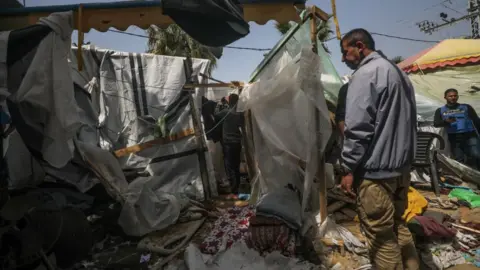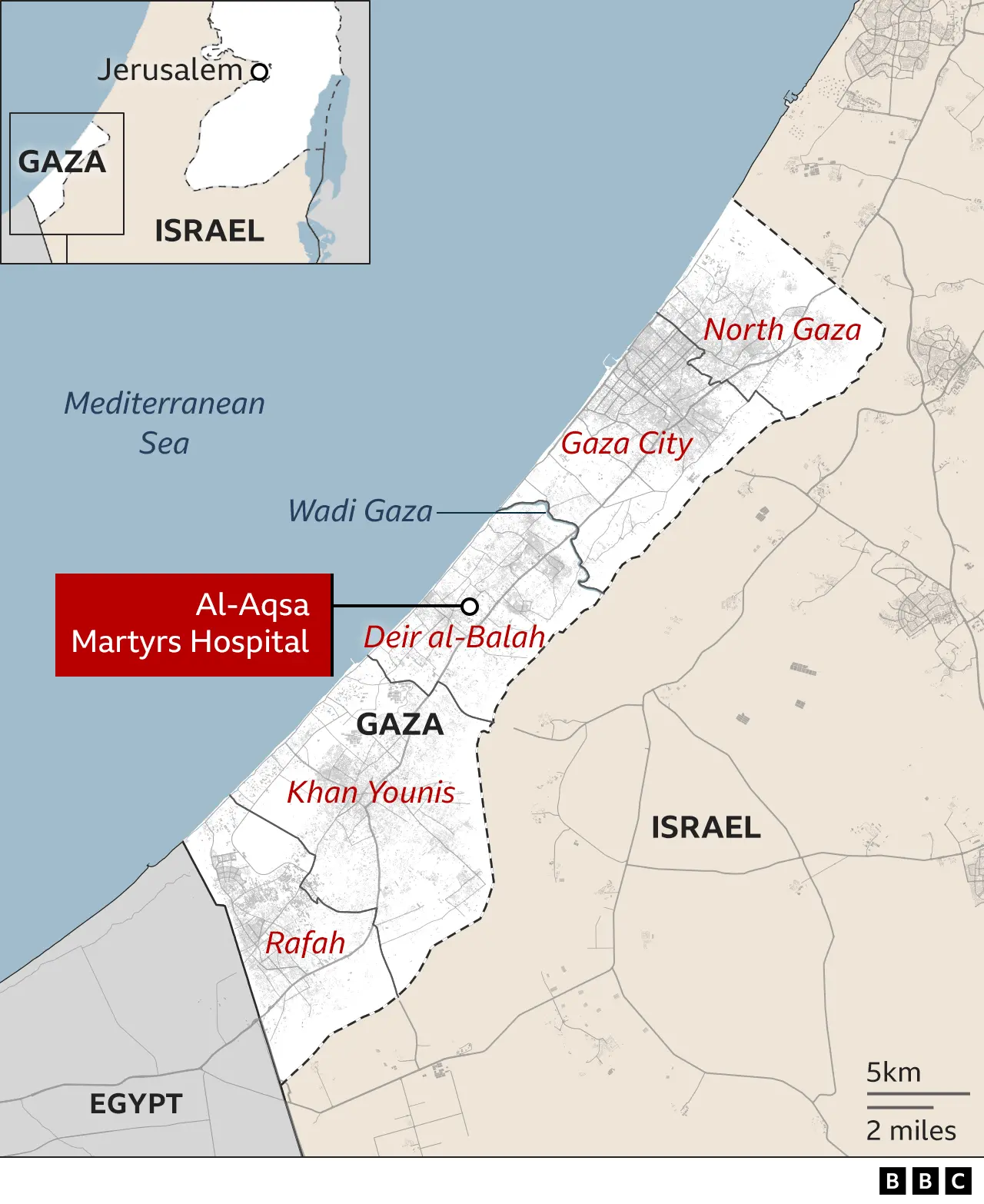Israel Gaza: Journalists injured in al-Aqsa hospital air strike
 EPA
EPASeven journalists, including a freelancer working for the BBC, have been injured in an Israeli air strike in the courtyard of a hospital in Gaza.
Four members of the Islamic Jihad (IJ) militant group were killed in the attack, the BBC understands.
The Israeli military said it struck an IJ command centre in the grounds of the al-Aqsa Hospital in Deir al-Balah.
Hamas and medical staff deny Israeli accusations that militants use hospitals as bases.
Islamic Jihad, an ally of Hamas, has not commented.
Al-Aqsa is the last hospital functioning in the central Gaza Strip.
The journalists were among hundreds who are sheltering in makeshift tents in the grounds of the hospital.
Most of the journalists camped inside the hospital grounds are from northern Gaza. They continue to work under extremely tough conditions, with little food, water or electricity, and the ever-present threat of Israeli strikes.
Many work by selling photos documenting life in and around the hospital, while also looking after their young families living with them inside the tents.
The tent closest to the explosion belonged to the Turkish news agency Anadolu.
"They hit the tent without any warning, we were staying in the tent as a group of journalists peacefully with no terrorists among us," Ali Hamad, a photographer, told Reuters news agency.
"We were preparing our cameras and all of a sudden the tent was hit, everything went dark with debris and rocks flying above our heads and there were flames."
Saeed Jaras, a freelance photographer, said: "We are unarmed journalists and we have nothing to do with anything."
The chief of the World Health Organization (WHO) said that four people were killed and 17 injured in the airstrike.
A WHO team at the hospital were all accounted for, Tedros Adhanom Ghebreyesus wrote on social media.
"We again call for protection of patients, health personnel and humanitarian missions. The ongoing attacks and militarisation of hospitals must stop. International humanitarian law must be respected," he added.
The Israeli military said "the command centre and terrorists were struck precisely, intended on minimising harm to uninvolved civilians in the area of the hospital".

Israeli strikes killed 77 people in Gaza in the past 24 hours, the Hamas-run health ministry said on Sunday.
It reported that nine more people died in an Israeli strike in Bani Suhaila near the city of Khan Younis.
Israeli Prime Minister Benjamin Netanyahu said on Sunday that an anticipated large-scale ground offensive in Rafah on the Egypt border would go ahead, despite the United States saying it would not support the operation.
Mr Netanyahu told a news conference that the offensive in Rafah, where there are more than a million displaced people, "is essential to victory".
Meanwhile, thousands of Israeli protestors gathered in Jerusalem for the largest anti-government demonstration since the start of the Gaza conflict.
Mr Netanyahu has faced widespread criticism for the security failure that led to Hamas's unprecedented attack on 7 October in southern Israel, during which about 1,200 people were killed and some 253 taken hostage. Of those taken, about 130 remain unaccounted for, at least 34 of whom are presumed dead.
Families of those held captive in Gaza have told their supporters "take to the streets" to protest against the Israeli government's handling of their release. The words mark a significant escalation in some of the hostages' relatives rhetoric against the government.
Since Israel launched its retaliatory operation, saying it was aimed at destroying Hamas, a total of 32,782 Palestinians have been killed and 75,298 injured, according to the Hamas-run health ministry.
Earlier this month, US Defence Secretary Lloyd Austin said that, of those killed, more than 25,000 were women and children.
